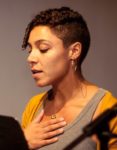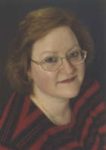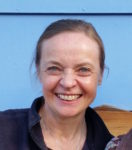Category Archives: Poetry
Protected: Sherry Chandler
Protected: Nancy Chen Long
Protected: Annie Hinkle
Protected: Andrea Uptmor
Protected: D. H. Bruun
Protected: Triin Paja
Protected: Tim Mayo
Protected: Susanna Lang
Protected: Sarah Nix
Protected: Patrick Venturella
Protected: P. V. Beck
Protected: Mary Moore
Protected: Marilyn Kallet
Protected: Lorcán Black
Protected: Wally Swist
Protected: Kathleen Boyle
Protected: Lori Desrosiers
Protected: Kate Fadick
Protected: Bruce Bond
Protected: Barbara Sabol
Les Kay
Les Kay is the author of Fronts (Sundress Publications, forthcoming 2016), and the chapbooks The Bureau (Sundress Publications, 2015) and Badass (Lucky Bastard Press, 2015), as well as a co-author of Heart Radicals (ELJ Publications, 2016) with Sandra Marchetti, Allie Marini, and Janeen Pergrin Rastall. He holds a PhD with a focus on Creative Writing from the University of Cincinnati and an MFA from the University of Miami, where he was a James Michener Fellow. His poetry has appeared widely in journals such as The Collagist, Redactions, South Dakota Review, Southern Humanities Review, Sugar House Review, Whiskey Island, and The White Review. He is also an Associate Editor for Stirring: A Literary Collection. He currently lives in Cincinnati where he teaches writing and cares for three small dogs. Follow him at: http://www.leskay.com.
Reprise, Nachtmusik
-After Gustav Mahler’s 7th Symphony
A broken man weeps on the serpentine
shore of the Seine;
Violins in vibrato counterpoint cellos.
he taps out times in search of a signature
to defy everything he’s ever learned.
A piccolo, or is it a rose, jaunts between arpeggios—
The hermetic rhythm of his daughter’s laugh
returns for a moment in slivers of song.
Pizzicato strings slap fingerboards;
a mandolin begins its thistled serenade.
She has been silent now for far too long.
Timbres entwine like crow and cardinal
in the throat of a white-winged mockingbird.
Bursts of cloud.
Key dissolves.
Elisabeth Murawski
Elisabeth Murawski is the author of Zorba’s Daughter, which won the May Swenson Poetry Award, Moon and Mercury, and two chapbooks. She is a Hawthornden Fellow. Publications include The Yale Review, FIELD, The Southern Review, Blue Lyra Review, et al.
Never from Here
a yellow moon
naked belly of the night
leans over the child’s bed
Chicago night
fish smells from the river
nothing but dread to eat
thin cotton nightgown
weaving a cocoon
about her shoulders
as she disappears
breath on a mirror
her habit
of covering her mouth
born here
prematurely tries to fly
Fuji covered with snow
a yellow moon
wrong part of the world
remembering a man
forever witness
in the corner of her eye
plumed hat velvet breeches
musketeer
observing her as event
the story in her hip
locked in
susceptible to touch
as her jumpy
hundred-meter heart
tripped by the starting gun
Rage Hezekiah
 Rage Hezekiah is the recent recipient of a MacDowell Fellowship, who earned her MFA degree from Emerson College. Her poems have appeared in Fifth Wednesday, Glassworks, Columbia Poetry Review, and Chicago Quarterly Review, as well as other journals, and are forthcoming in the minnesota review, and Painted Bride Quarterly. Her writing has been anthologized in Other Tongues: Mixed Race Women Speak Out and All We Can Hold, a collection of poems on motherhood.
Rage Hezekiah is the recent recipient of a MacDowell Fellowship, who earned her MFA degree from Emerson College. Her poems have appeared in Fifth Wednesday, Glassworks, Columbia Poetry Review, and Chicago Quarterly Review, as well as other journals, and are forthcoming in the minnesota review, and Painted Bride Quarterly. Her writing has been anthologized in Other Tongues: Mixed Race Women Speak Out and All We Can Hold, a collection of poems on motherhood.
February Cove
We are ten and bundled crown to toe
scaling frozen boulders on the beach,
our parents home and snow day drinking
no longer watching from the window.
I claw wet rocks in your wake, desperate
to keep pace, soak my wool mittens through,
neglecting numb hands. You are a boy
fresh with adventurous, outdoor ideas,
brimming with strange stories. As we climb
you tell of sharp-toothed creatures buried deep
in frozen ocean, point into the distance
where jagged rocks break the placid ice,
a hundred little births along the surface.
With our arms spread wide we run
along the snow-covered sand, almost expecting
to be caught, like how we secretly hope
we’re found during every game of hide and seek.
Bathed in a frantic energy we generate for fun,
both of us panting plumes of warm breath
into air, salted-cold. We embrace the tension
of fear and exhilaration here,
the last great year of our imagination.
Barbara Krasner
 Barbara Krasner holds an MFA in Creative Writing from the Vermont College of Fine Arts and an MA in History from William Paterson University. Her literary work has appeared or is forthcoming in Michigan Quarterly Review, Nimrod, Paterson Literary Review, Jewish Women’s Literary Annual, and Minerva Rising, among other journals. She teaches creative writing in New Jersey.
Barbara Krasner holds an MFA in Creative Writing from the Vermont College of Fine Arts and an MA in History from William Paterson University. Her literary work has appeared or is forthcoming in Michigan Quarterly Review, Nimrod, Paterson Literary Review, Jewish Women’s Literary Annual, and Minerva Rising, among other journals. She teaches creative writing in New Jersey.
Bei Mir Bistu Shayn
The Andrews Sisters sing on the radio
while she poses for the photograph. She
lifts three fingers to her chin, wrist bent,
the platinum onyx-diamond ring her papa
gave her dead center. But he would never say,
“Bei mir bistu shayn.” Not one compliment.
“You should go out and change the world,”
he’d say. She’s happy enough with the ring.
Her hair’s done up Betty Grable-style
with a bit of lace like baby’s breath pinned
to her crown. The black and white photograph
will not capture her blood red nails, blood red lips.
She’ll send Milton the picture. He’ll slip
it into his wallet at first to keep it safe. She
could teach him manners. Even in that foreign
land of Jersey she knows he’ll be a good provider.
“Bei mir bistu shayn,” he’ll say to her
and mean it, his eyes misting. He encases the photo
in a silver frame against magenta foil with
a four-bullet flank. He places it
on top of the bedroom TV console.
Years later, as she lies dying at Clara Maas, I
stroke her forearms, soothe her paper-thin
temples. I call her Shayne Leah. She grasps all of me.
She watches over me from her place fronting
my dresser mirror. Mama, bei mir bistu shayn.
You’ll always be beautiful.
Jamie Wendt
Jamie Wendt is a graduate of the University of Nebraska Omaha MFA program. She received a Bachelor of Arts in English from Drake University. Her poetry has been published in a variety of literary journals, including Lilith, After Hours, ROAR Magazine, Green Mountains Review, and Saranac Review. Her essay, “American Jewish Women Poets,” was published by Green Mountains Review. She contributes book reviews for Jewish Book World. Wendt teaches high school English and lives in Chicago with her husband and daughter.
When Amma had Four More Months
Between us on her sagging bed
is an old heavy box
I would inherit along with many names.
Amma’s lifetime of jewels
stare into the widening gap between life and death.
Silver and turquoise shine in her shaking palm.
Amid rusting silver charms and flowery pins,
a golden “J” – our shared initial – dotted with diamonds,
slung on a long chain. I pluck what I want to keep.
Her name will belong to my future daughter.
The diamonds I did not take decide to return
many years later in her questions about what remains,
and my young wistfulness, incomprehension
of death and the passing on of things
was like water evaporating from a bedside paper cup.
Amma’s brittle thumbnails open the clasp.
Her hands, deep red bruises
beneath thinning flesh move toward me,
swoop the necklace under my chin, locking it
under my ponytail. We admire my rich image
in the small mirror of the jewelry box.
Amma prophesizes about all the boys,
her pearl studs glimmering in my ears,
begging me to dance with them.
Beate Sigriddaughter
 Beate Sigriddaughter lives and writes in Silver City, New Mexico, Land of Enchantment. Her work has received four Pushcart Prize nominations and won four poetry awards. In 2015 ELJ Publications published her latest novel, Audrey: A Book of Love. Find her site at www.sigriddaughter.com.
Beate Sigriddaughter lives and writes in Silver City, New Mexico, Land of Enchantment. Her work has received four Pushcart Prize nominations and won four poetry awards. In 2015 ELJ Publications published her latest novel, Audrey: A Book of Love. Find her site at www.sigriddaughter.com.
Bricks
Silence.
There are things we must not say.
There was a time when the law said
a woman who speaks out
against a man shall have her mouth
crushed with fire bricks.
There was a time when the law said
adulterers must be bound
and thrown in the river, even
when the woman was raped.
Her husband could pull her out
of the river, if he so desired, while
the king himself could save
a valuable man.
I am tired and heavy with things
I must not say. This silence feels
like grain of broken brick
between my teeth.
Arthur, with affectionate regret,
did not choose Guinevere
over law or flames. Would you
pull me from the river
if they tossed me there
against my will?
That is the question.
Oh, I remember, I am not supposed to
take things personally. But I am
the daughter of daughters of women
who were miraculously
neither drowned nor burned.
They have trained me with such memory
so you no longer have to crush
my mouth with bricks. All you have
to do is look at me a certain way.
This silence is not easy to undo
How I hate this silence.
Valery V. Petrovskiy
Valery V. Petrovskiy is a Chuvash University, Cheboksary graduate in English. He graduated from VKSch Higher School, Moscow, in Journalism. A short story writer (Pushcart Prize nominee, a finalist to Open Russia’s Literary Championship, 2012), he is the author of two flash collections: Into the Blue on New Year’s Eve (Hammer and Anvil Books, 2013) and Tomcat Tale (Editura StudIS, 2013). He published poems in The Missing Slate, Ivory Tower, BRICK rhetoric, CLRI. Valery lives in Russia in a remote village by the Volga River.
On a town street
On a town street right after the highway turn,
Some cars were parked with the backs to a road.
They rested their horns against family gates,
As cows would stand there, shifting from one foot to the other.
The cars differed much, whilst there were no folks around.
Most likely people went in to visit own Mom.
There they washed their hands, had a hot Russian soup of boiled nettle,
And later at supper, ate some baked kasha, while Mom was talking to a cat.
In the morning, her grown up children got into the car
With their own kids, who had strange names and weird nicks.
In the end, when all the cars were gone, the cat remained with Mom alone.
They will come back on a holiday: Nika, Vassilissa, Akulina, and Zakhar.
- Yes, Mom, I do remember: life is not all milk and honey.
Please, Mom, eat less salt as Doc prescribed.
Sure, we dropped in at the burial ground,
Dad’s tombstone is in the right place, not gone.
No, I have no more summer cottage; it’s not one’s money worth.
- Well, the neighbors do quite well…
- Mom, you don’t say so, you don’t.
Life is all the same around:
One stays at home, expecting a rain in summer,
And in winter, one sits waiting they scrape the road.
Wesley Riggs
Wesley Riggs workshops his fiction and poetry at Lighthouse Writers’ Workshop in Denver. He built a summer cabin in Alaska, where he has been lodging since last winter. He is working on poems, a novel, and a children’s book series for his three nephews.
Even If
even if I return from
a jungle
reciting ten foreign names
for the lashes across my tongue
or stroll up
a beach
as a barefooted breeze
combs my hangover
peace you won’t have
me
even
if you find me tomorrow
and say it was all a
farce or a feeling and
here I am now have me
Alexis Groulx
 Alexis Groulx’s work has been previously published in Ayris, After the Pause, Gravel, and Vineyards press. She lives in New Hampshire.
Alexis Groulx’s work has been previously published in Ayris, After the Pause, Gravel, and Vineyards press. She lives in New Hampshire.
An afternoon with Cal
for D
*
This cemetery all
stone steps — overgrown
grass. You cautiously step
toward a headstone.
Face it. 206 bones.
A siren whirs on a back road.
*
Your finger over the R
the L, his name, indentations
his headstone filling –
sponges of moss, cob-webs.
You, hesitant – longing.
*
Trace my fingers over
the year he died. Wait
for you to ask if we were
trespassing. Take a picture
with your phone, I would shake
my head. The bones don’t know
who is taking care of them.
